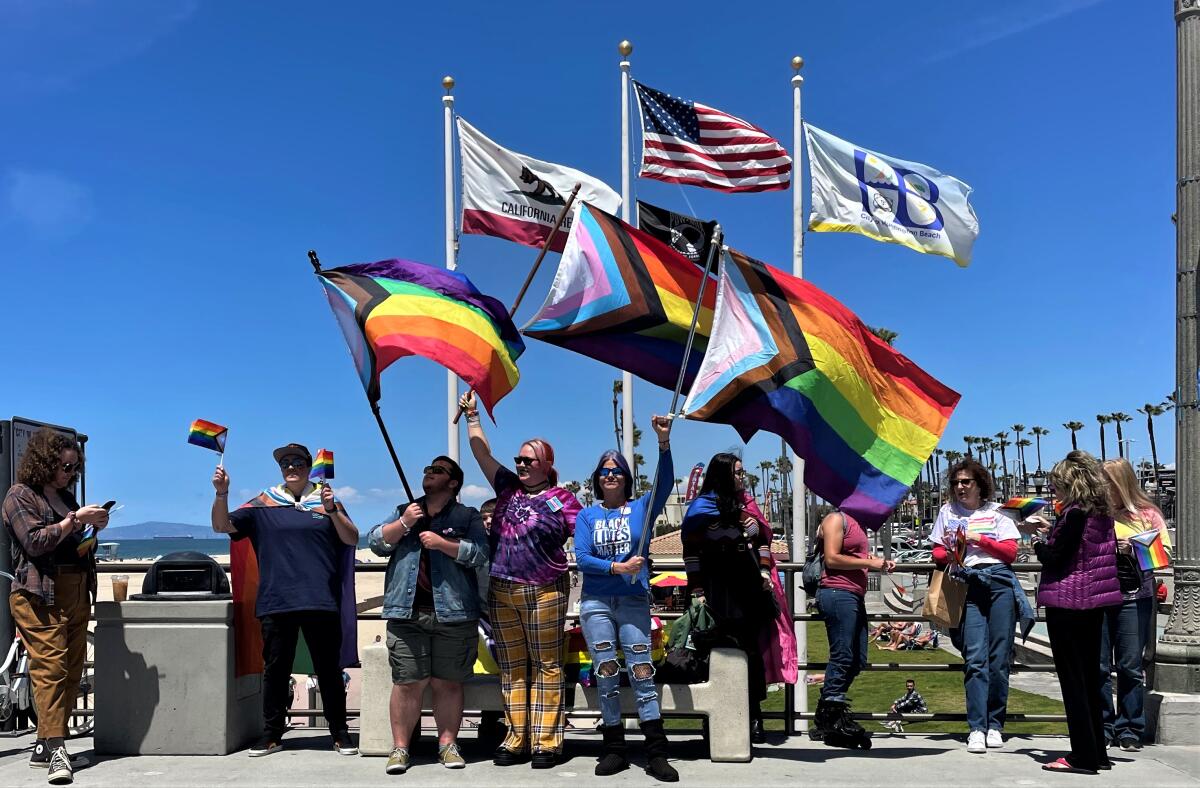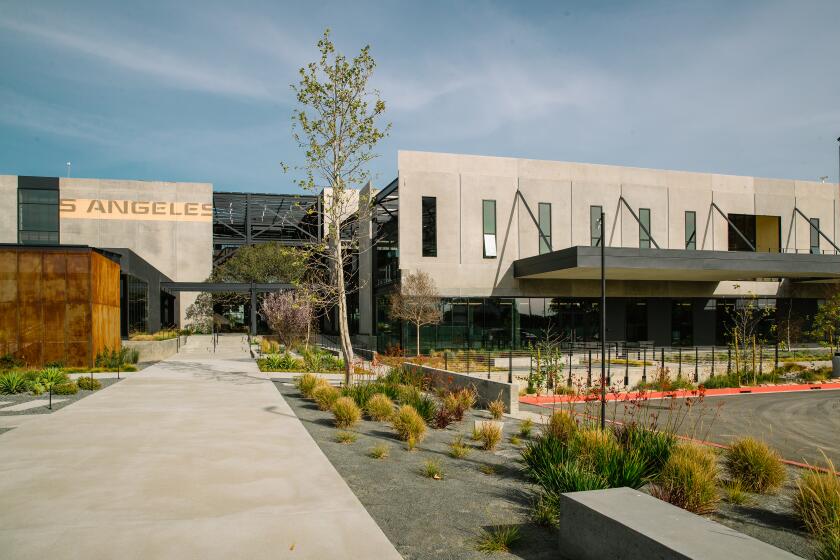Apodaca: Huntington Beach is moving away from progress

- Share via
The extreme right-wing majority on Huntington Beach’s City Council has stirred up so much controversy in its brief reign that it’s tough to keep track of all the decisions that have outraged many residents.
Just recently council members proposed charter amendments to require voter ID and ballot box monitoring; voted on bans on mask and vaccine mandates; changed the city’s policy on human dignity by cutting references to eliminating hate crimes and adding anti-transgender language; pushed for restrictions on certain library books; and restructured, consolidated or dissolved several longstanding citizen-led committees and commissions.
There’s been such a flurry of contentious moves that the council’s vote last February to effectively ban the rainbow Pride flag on city property now seems like ancient history — as well as a warning of more to come.
But for now I’d like to focus on one particular issue: Among the committees that the four-member majority killed was the one dedicated to human rights.
When looking at this decision, it’s helpful to take a step back and examine what human rights are really all about.
The term “human rights” might sound a bit vague, but it generally refers to the ability to interact in a healthy manner with others and build strong relationships. The modern human relations movement actually began in the business world, as a way to help employers succeed by changing their thinking of workers as replaceable cogs.
Founded by sociologist George Elton Mayo in the 1930s, the movement was based on a series of experiments known as the Hawthorne Studies, which examined the link between employee satisfaction and workplace productivity.
The movement, and the term, eventually morphed into something more expansive. In 1951, Philadelphia became the first U.S. city to form a human relations agency to combat prejudice and discrimination.
The idea spread, and a couple of decades later Orange County joined in. Since the early 1970s, the county has maintained an organized human relations effort in one form or another, with the intention of eliminating prejudice, intolerance and discrimination. The current iteration is the nonprofit Groundswell (formerly OC Human Relations), which contracts with the county and works with schools, businesses, other government entities, police departments, foundations and others to foster communication and build secure and inclusive communities.
Daily Pilot columnist Patrice Apodaca laments the decline of local news outlets and the rise of social media and other online platforms that aggregate information specific to users, including content that confirms their biases.
“To me, human relations is about bringing diverse people together and seeing how we can better understand the people we share our community with,” said Alison Edwards, chief executive officer of Groundswell.
Ultimately, all people want to feel safe in their schools, homes and workplaces, she said. In order to accomplish that, communities must build trust among various groups and individuals.
“We provide that kind of space for people to meet, share their ideas and humanize one another.”
Groundswell also provides the county with its annual hate crimes report. The latest report, released on Sept. 21, showed that hate crimes jumped 67 percent last year, and hate crimes and incidents together increased for the eighth consecutive year.
One particularly troubling finding: Alleged hate incidents at schools jumped to 103 from 41 in 2021. Keep in mind that such incidents are routinely underreported.
Clearly, human rights organizations are needed.
Back to Huntington Beach.
In voting to disband the city’s 26-year-old Human Rights Committee, the council members in favor suggested that the committee’s efforts were redundant, as they duplicated work done by police and by Groundswell.
This wholly unsatisfying rationale ignores the fact that many cities throughout Orange County maintain their own human rights committees because their leaders recognize that every community has a specific set of concerns and objectives.
Indeed, Huntington Beach’s now-disbanded Human Rights Committee was formed after the 1994 murder of a Black man and the 1996 attempted murder of a Native American, both at the hands of white supremacists.
The committee has done good work over the years — partnering with the Huntington Beach Police Department to track hate crimes and incidents, overseeing educational programs and organizing community events — and it has had a positive impact. The city was making significant progress in moving away from its past notoriety as a haven for individuals and groups that promoted hate and sometimes used violent means to spread their noxious ideologies.
But to suggest that Huntington Beach is no longer a town in need of continuing vigilance when it comes to human rights, or that the committee’s work is superfluous, defies reality. Just last year there were 14 hate crimes and incidents in the city, according to the HBPD, and this year has seen more of the same, including the distribution of anti-Semitic fliers and a surge in anti-LGBTQ+ hate incidents.
This is a city that hosts major events such as the U.S. Open of Surfing and this weekend’s Pacific Air Show, and courts tourists and corporations that fuel economic growth. Now some elected leaders are sending the message that not all are welcome. That’s bad business.
But more to the point, failing to use the city’s resources to fight intolerance and bigotry displays a shocking lack of concern about such vile behavior. The council is neglecting its responsibility to protect all citizens. It’s moving Huntington Beach backwards, and that is just plain wrong.
All the latest on Orange County from Orange County.
Get our free TimesOC newsletter.
You may occasionally receive promotional content from the Daily Pilot.





